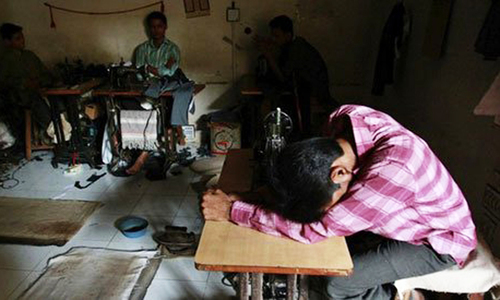ISLAMABAD: The electricity shortfall surged once again to about 6,000 megawatts on Monday as temperatures rose to 46-47 degrees Celsius in most of the southern region, resulting in unscheduled load shedding of 12-16 hours.
Reports from various parts of the country suggested 7-9 hours of load shedding in major urban centres and 10-18 hours in rural areas.
Officials in the Ministry of Water and Power said electricity demand reached close to 19,000MW on Monday while overall power supply was around 13,500MW, leaving a 5,500 MW gap that was filled through systematic closer of feeders to protect the system stability.
Sources in operation areas suggested the overall power generation was around 12,700MW, with an estimated shortfall of 6,300MW.
Around 10,000MW of electricity was actually reached the consumers, after accounting for 6-7 per cent transformational and transmission losses and 17-18pc of distribution losses, sources added.
The sources said it had become a Herculean job to stabilise power system with such a big gap. The field staff is left with no option but to exercise discretion depending on the ground situation at a given time, they added.
These closures become inevitable to avoid a complete breakdown in the system because of frequency mismatch, the sources explained.
They said it is unusual to see 47 degrees Celsius in Sibbi, Bhakkar, Rahimyar Khan and Khanpur while Dadu, Bahawalpur, Bhawalnagar, Larkana, Sukkur and Shorkot experienced 46 degree Celsius in April.
Comparatively, larger load centres like Multan, Faisalabad, Dera Ghazi Khan and Joccobabad witnessed 45 degree temperatures.
The sources said hydropower projects contributed a maximum of 2,000MW while public sector generation companies produced 2,700MW and independent power producers generated almost 8,000MW.
Officials said the next 10 days are very crucial because of increasing demand arising out of rising temperatures in big cities, minimum contribution from hydropower plants and closure of some units for scheduled maintenance.
A number of new and closed plants would start coming into the system, starting with 1,600-1,700MW pouring in from three plants within the next 10 days.
This includes 525MW from Nandipur, 315MW from Chashma Nuclear and an expected injection of 760MW from the under-construction Bhikki plant.
This will end the forced load shedding and the system would return to normal load management of 4-5 hours in urban and 6-8 hours in rural areas.
This would be followed with an addition of about 1,300MW from two units of Guddu and Sahiwal Power Plants in the first week of May. One unit of Haveli Bahadur Shah will add 380MW in July and another two units of the same plant as well as Sahiwal will add 1,040MW in August. Production from hydropower would also start going up.
In September and October, 760MW from Balloki and 1,460MW form Port Qasim, Bhikki would be added while a fourth unit on Haveli Bahadur would start flowing in December.
Published in Dawn, April 18th, 2017











































